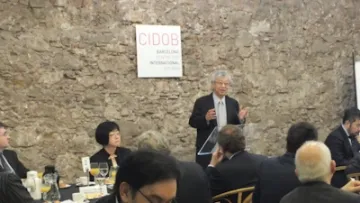On the Present State of the Japanese Economy: A Message to European Economy

On October 24, Dr. Motoshige Itoh, Professor of Economics University of Tokyo and considered by many as the intellectual father of Abenomics, visited CIDOB in the framework of the European-Jaume Arias breakfasts Series, to give a lecture at CIDOB on the current state of the Japanese economy and the major results of Abenomics, the set of economic measures launched by the government of Shinzo Abe for years ago.
His speech reviewed the future economic challenges for the Abe administration, as well as the main achievements of the combined “three arrows” or fields of action of the economic policy reforms that pursue, after decades of stagnation, the revival of the Japanese economy.
Regarding the first of the arrows, “Monetary Policy”, Professor Itoh made some comparative analysis with other developed economies, reminding us that some of them also affected by similar problems "could really benefit from the Japanese experience". About the second arrow, the “Fiscal Reform”, professor Itoh acknowledged that could somehow affect private consumption on the initial stage, but also, produce positive effects such as the raise of wages, the outrun of deflation and the increase of government’s revenues. In that context, he also made some reference to the remarkable amount of public debt owed by Japan, but that mainly remains in the hands of Japanese banks and corporations, that sometimes, are too reluctant to invest in the real economy. About the third arrow, “Structural reform”, he admitted that it is the harshest to implement, and stressed the importance of pursuing the reforms highly needed, with strong political commitment and in accordance to the requirements of Japan’s International compromises, such as those acquired through the Free Trade Agreements. In the field of this structural reforms, he gave importance to the set of policies popularly known as Womenomics, that he considers an effective tool for rebalancing gender inequalities and encouraging women to participate in the labor market.
Prof. Itoh also emphasized the importance of a Comprehensive Growth Strategy that would have Innovation policies as the key element for increasing the productivity of the economy without adding extra pressure to the already “exhausted” Japanese-workers, while dealing effectively with another pressing issue in Japan, that of the aging population. In this context, he described as “an opportunity for Japan” to lead the upcoming “Forth Industrial Revolution”, on the basis of the advantages that will bring the Internet of Things and the transition towards more clean and sustainable energies.
Other relevant issues discussed during this event were the upcoming conclusion of the EU-Japan Free Trade and the prospect of the already signed Trans Pacific Partnership (TPP), still to be ratified by the US and that could be in question under the new presidency that would emerge from the next election. Acknowledging that Trump opposes the TPP and Clinton has been very critical with the outcome of the negotiation, Prof. Itoh saw as crucial that the ratification could take place before the departure of President Obama’s from the Oval Office.